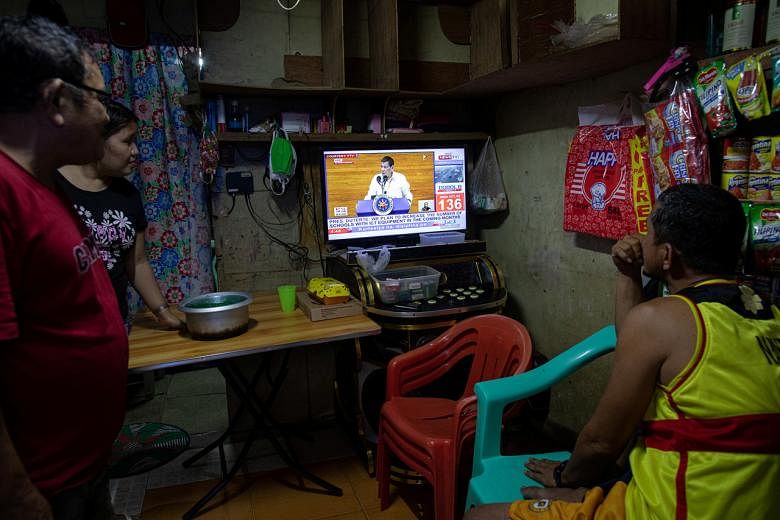"All the world's a stage," wrote Shakespeare. "And one man in his time plays many parts."
Tossed between rapacious empires and feckless oligarchs throughout the centuries, the Philippines has never had any leader like Rodrigo Duterte.
Here is a man who plays a thousand roles at the helm of power, a consummate thespian crowned by a besieged people in their darkest hours.
And if we were to believe, on face value, the latest surveys, President Duterte is also the world's most popular leader.
What is his magic?
Mr Duterte is a man of many firsts, a singular figure in our nation's history.
Not only is he our first president from the long and unjustly marginalised island of Mindanao, a land bristling with untold talent and untrammelled aspirations, but he is also the first mayor to have been catapulted straight to the presidential palace.
In a long line of perfumed and posh leaders, he proudly stands apart as the scruffy and cuss-laced "man of the people".
I vividly remember how, during an awarding ceremony in Malacanang, the President, then still in his first year in office, boasted that he is "haunted by former presidents" since he always "misbehaves".
In a country where the elite love to brandish their Hispanic ancestors and American accents, Mr Duterte has proudly claimed to have come from Muslim (Maranao) and even Chinese ancestry.
Where Mr Duterte stands out the most from his peers and predecessors is his venomous disdain for the West, particularly America, and, accordingly, his unabashed fawning over the authoritarian leaders of Russia and China.
His foreign policy has been a surreal melange of contradictions and chutzpah.
In truly populist fashion, he has threatened to bankrupt the country's most powerful businessmen, the mestizo billionaires who dominate the economy and have long been seen as untouchable.
Most crucially, though he is the oldest man to have ever occupied Malacanang, Mr Duterte, 75, is the most media-savvy and energetic leader in the country's history.
And here lies his ultimate secret to power, the fountain of his unfathomable charisma.
By any objective standard, Mr Duterte's governance record is at best mixed, and, in certain areas, plain mediocre.
Just think of his handling of the Covid-19 crisis.
According to the international medical journal The Lancet, the Philippines' crisis management ranked in the bottom third of surveyed nations, a dismal 66th out of 91 countries.
Hit by the worst outbreak in the region, the Philippines is also expected to suffer the second-worst economic contraction this year.
No serious thinker would look at key national indicators in recent years and think that competence is the name of the game.
But Mr Duterte remains popular because he knows how to "project" leadership in our postmodern simulacrum where "impression management" trumps actual performance.
Scholars often use the term "performative governance" for this brand of leadership.
The great scholar of populism Ernesto Laclau also aptly used the term "empty signifier".
In our attention-deficit "age of social media", do people really care about detailed, factual analyses?
In the midst of this crisis, we have seen an emotionally transparent leader, ringed by generals and top Cabinet members, delivering regular State of the Nation perorations.
Meanwhile, legions of online propagandists carefully nip any criticism in the bud and tirelessly reinforce a curated image of a decisive and reliable leader.
Then there is the generalised climate of fear in working-class communities, the main survey respondents as well as primary witnesses to Mr Duterte's scorched-earth drug war.
Notice the "somewhat approve" numbers in surveys.
Interestingly, the latest Pulse Asia surveys coincided with the Bayanihan 2 financial assistance to millions of anxious Filipino families, who desperately yearn for a "strong leader" amid a generational crisis.
In fact, it's precisely this atavistic need for a tough leader, a "father figure", which explains why Mr Duterte's populist peers are experiencing historic approval ratings.
At the height of the crisis, India's Prime Minister Narendra Modi saw his approval ratings surging to 90 per cent, while Turkish President Recep Tayyip Erdogan enjoyed a 14-point bump.
Even Brazil's President Jair Bolsonaro, widely seen as among the most incompetent leaders in recent months, is garnering his best approval ratings yet.
But, above them all, at 91 per cent, is Mr Duterte - the master of performative governance, his populism a Shakespearean stage.
• The writer is a columnist at the Philippine Daily Inquirer. The paper is a member of The Straits Times' media partner Asia News Network, a grouping of 24 news media titles.

